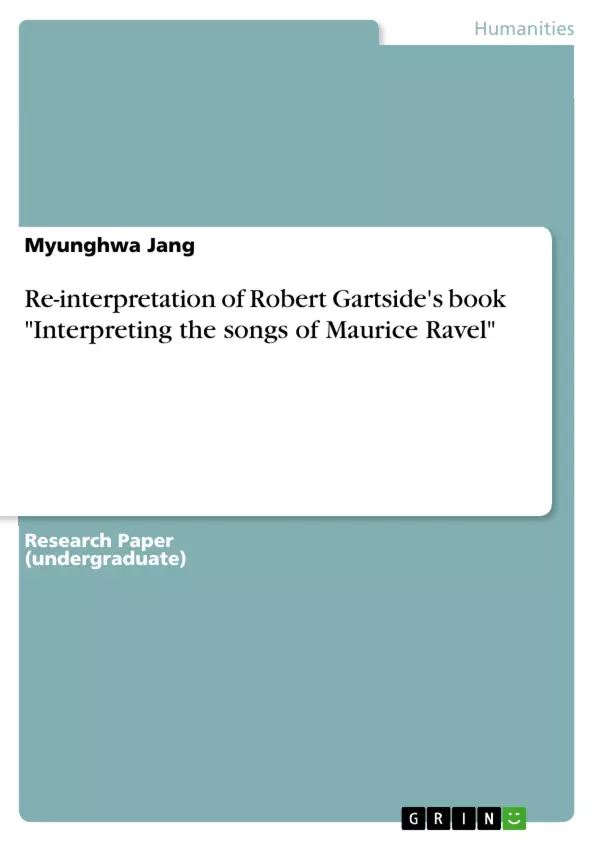French composer Ravel, “a notorious student” of Faure, at the beginning of his academic and music career had a hard time making his name in the musical arena. During his academic years at The Paris Conservatory he failed Harmony three consecutive years, and tried five times to win Prix de Rome but luck was not with him so he did not succeed. In spite of these anguished moments in his life he did not give up and continued his work with strong commitment and determination which brought him to the spotlight later on. His era stats at the end of Romanticism, goes through the Impressionism and ends in the modern period. The French language directly and, the French culture indirectly have deep impact on his style and work. Great music has universal language. It does not matter in which language it has been performed as long as it leaves deep throbbing, thrilling and emotional impression on the audience and the listeners it is considered great. Each listener interprets the music in accordance with his or her own talent, understanding and wisdom, thus there is no single interpretation of music. The performance of the artist, his or her emotions, his or her style, language in which he or she performs and the aesthetic taste of the listeners play an important role in making opinion about great music.
Inhaltsverzeichnis (Table of Contents)
- Introduction
- The French Language in Music
- Ravel's Use of the French Language
- Interpreting the Music
- Conclusion
Zielsetzung und Themenschwerpunkte (Objectives and Key Themes)
This book explores the unique characteristics of the French language and its influence on the music of Maurice Ravel. The author aims to guide performers in interpreting Ravel's songs by analyzing the specific challenges and opportunities presented by the French language in musical composition.
- The influence of the French language on Ravel's musical style
- The challenges and opportunities presented by the French language in setting words to music
- The importance of performer interpretation in communicating the meaning of Ravel's songs
- The role of rhythm, harmony, and tempo in shaping the emotional impact of Ravel's music
- The importance of understanding the historical and cultural context of Ravel's music
Zusammenfassung der Kapitel (Chapter Summaries)
- The first chapter explores the use of symbols in different languages and the specific complexities of French language symbols. It discusses the pronunciation of vowels, nasal sounds, elisions, and the schwa.
- Chapters two and three delve into the unique qualities of the French language in music and its impact on Ravel's work. The author examines the constraints and opportunities of the French language, such as its limited vocabulary and lack of falling cadence.
- Chapter four focuses on the art of interpreting music and conveying its meaning to the listener. It introduces seven key elements of gesture that performers should consider, including the curve of line, rhythm, harmony, and tempo.
Schlüsselwörter (Keywords)
This work focuses on the French language, Maurice Ravel's music, performer interpretation, musical analysis, and the role of rhythm, harmony, and tempo in shaping the emotional impact of music.
Frequently Asked Questions
How did the French language influence Maurice Ravel's music?
The French language directly impacted Ravel's style, particularly in how he set words to music, dealing with unique qualities like nasal sounds, elisions, and the lack of falling cadence.
What were the early challenges in Ravel's musical career?
Ravel failed his Harmony exams for three consecutive years at the Paris Conservatory and famously failed to win the Prix de Rome five times before achieving success.
What are the key elements for interpreting Ravel's songs?
Interpretation involves seven key elements of gesture, including rhythm, harmony, tempo, and the "curve of line" to convey emotional meaning to the audience.
What specific French linguistic features are discussed in the book?
The book analyzes the pronunciation of vowels, the use of the schwa, nasal sounds, and how these symbols create complexities when translated into musical notation.
Why is there no "single interpretation" of Ravel's music?
Because music is a universal language, each listener and performer interprets it based on their own talent, emotions, cultural context, and aesthetic taste.
Which musical periods did Ravel's career span?
His work started at the end of the Romantic period, moved through Impressionism, and concluded in the Modern era.
- Quote paper
- Myunghwa Jang (Author), 2010, Re-interpretation of Robert Gartside's book "Interpreting the songs of Maurice Ravel", Munich, GRIN Verlag, https://www.grin.com/document/161485



